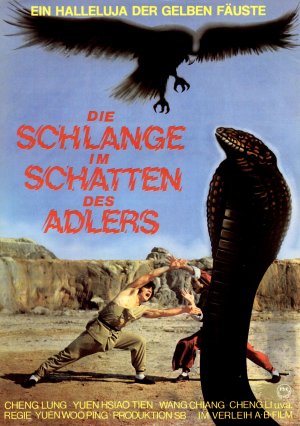
It’s almost impossible to overstate the impact of Yuen Woo-ping’s SNAKE IN THE EAGLE’S SHADOW. The five year period after Bruce Lee’s death was a dark one for the kung-fu industry, which floundered as it searched desperately for a new mega-star to rally around. The studios turned to Bruceploitation, international co-productions (THE LEGEND OF THE 7 GOLDEN VAMPIRES, THE STRANGER AND THE GUNFIGHTER, THE MAN FROM HONG KONG), and failed attempts to launch young performers as the “next Bruce Lee”.
The story of Jackie Chan in this context is a fascinating, and often ironic, one. A former member of the Seven Little Fortunes Peking opera performance troupe, Jackie had – like his classmates – become a stuntman in Shaw Brothers productions of the late 60s before moving on to small roles in a variety of films in the early 70s. After being seen in John Woo’s HAND OF DEATH by producer Willie Chan (who eventually became his manager), Jackie was picked to be Bruce Lee’s successor and matched up with Lo Wei – director of Lee’s THE BIG BOSS and FIST OF FURY – for a series of disappointing films throughout 1976 and 1977. These films – TO KILL WITH INTRIGUE, THE KILLER METEORS, NEW FIST OF FURY – see Jackie attempting a variety of personas and styles, with him even playing a villain in THE KILLER METEORS.
It wasn’t until he was loaned to Seasonal Film Corporation for a two picture deal that Jackie finally came into his own, thanks in large part to the partnership – and choreography – of director Yuen Woo-ping and the creative direction of producer Ng See-yuen. The idea of mixing comedy, kung-fu and acrobatics wasn’t entirely original, but the charisma of the performers and the quality of the fighting entranced audiences – particularly after the release of DRUNKEN MASTER later in 1978 which solidified Jackie Chan as the superstar he was always primed to be. The following years saw hundreds of films which attempted to copy the formula of SNAKE IN THE EAGLE’S SHADOW – even classics in their own right like THE PRODIGAL SON and THE MAGNIFICENT BUTCHER – but this is where it all started.
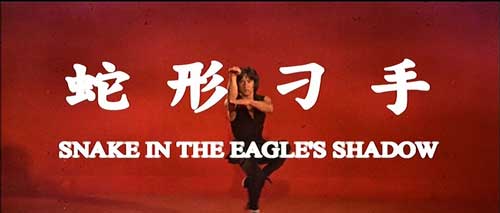
Despite being produced by the independent Seasonal Film Corporation, the film begins in classic Shaw Brothers style with Jackie showing off his Snake fist kung-fu against a red background. It’s interesting to note that despite Jackie playing a comedic character in the film, the humor is significantly more muted than it would become in later films. In fact, Jackie’s character Chien Fu is thought of as “slow” at the beginning of the film, far from the mischievous youth he generally plays in his other popular old school kung-fu films.
Our storyline is defined in the film’s opening scene, where the Lord of the Snake Fist (Fung Hark-On, the baddie from THE MAGNIFICENT BUTCHER) takes on Lord Sheng Kuan (“Thunder Leg” Hwang Jang Lee), who is trying to rid the world of all Snake Fist practitioners. Sheng Kuan is a master of the Eagle’s Claw, and uses his impressive skill (though, sadly, not many of his trademark kicks) to quickly kill the Snake Fist master. He dedicates himself to tracking down and killing the remaining masters: Pai Chang-tien and the master’s son. I’m sure that will come into play soon.
In a nearby town we’re introduced to one of the most enduring and popular characters in all of old-school kung-fu. It’s a filthy old beggar, who just happens to be a kung-fu master. Yuen Woo-ping cast his father Yuen Siu Tien in the part – and in the similar role of Beggar Su Hua Chi/Sam Seed in DRUNKEN MASTER – which made him famous at the ripe old age of 65. We get a comedic series of fights where the beggar’s landlord demands rent before being bitten by his pet snake, leading to Yuen Siu Tien showing off some impressive moves (thanks to extensive doubling) in battling the landlord and his assistants.
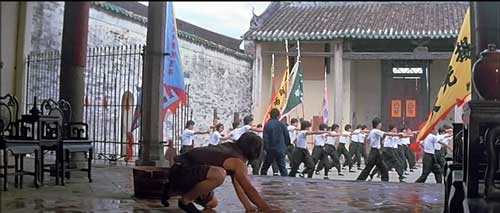
Meanwhile we see the nearby Hung-tai kung-fu school whose master is currently away, leaving the asshole Teacher Li (Dean Shek) in charge along with his co-teacher Lung Chan. Chien Fu (Jackie Chan) is a cleaner at the school, and is used frequently as a tackling dummy used so the teachers can show off their dragon-tiger fist. This usually leads to Chien Fu being humiliated in front of the students, and running off crying. Chien Fu isn’t a secret kung-fu genius or anything like that. He really is just a janitor who aspires to one day learn at the school.
The biggest competition to the Hung-tai school is the Wei-wu school, ran by Teacher Chui (Fung Ging-man, who seems to pop up in every old-school kung fu film). They are desperately trying to get the governor’s fat-ass son Ah Kwai (Chiang Kam, who played Sammo’s brother in THE MAGNIFICENT BUTCHER) to enroll in their school, getting their instructor Mr. Liang (Chu Chi Ling) to demonstrate breaking some bricks to impress the kid. Unfortunately, while he’s able to break them, he also almost breaks his hands, which is eventually – comically – revealed. The governor and his son decide to learn elsewhere, but as the school’s teachers and students file out they notice the sleeping beggar (Yuen Siu Tien) next to their dooryway, and decide to take out their frustration on him. Chien Fu wanders by and sees the old man being attacked, and he jumps in to help – able assisted by the beggar, who manipulates his pole (ha!) to keep him out of danger and fight off the baddies.
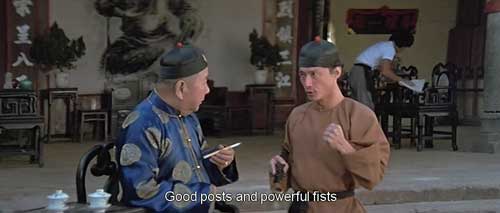
Chien Fu brings the old man back to the Hung-tai school, feeding him and introducing him to his pet cat (named “kitty”). At the same time the governor is getting a demonstration from Teacher Li, who is hoping to get the snot-nosed kid to learn at their school. Once again Chien Fu is called in to have his butt kicked by one of the students. Pleased by the exhibition, Ah Kwai decides to learn at the school. Chien Fu is depressed by his constant humiliation, so the old man cheers him up by playing a game of keep-away with a bowl. Watching the relationship between Chien Fu and the old beggar – who we discover is (of course) actually Grandmaster Pai Cheng-Tien – develop is a lot of fun, and is quite different than the traditional master/student relationship in many older kung fu films. We also learn that Pai Chen-Tien prefers to drink his tea cold. This might be an important thing to remember.
The next day Chien Fu wakes up to discover footsteps have been drawn on the stones outside his room, with some instructions on how to improve his footwork as a means of escaping danger. Of course, in no time Chien Fu becomes adept at the skill, while Cheng-Tien seeks out Chao Chi-chih. Instead he runs into a Missionary (Roy Horan) who follows him into an abandoned house, where he reveals himself to be a Russian martial arts master – stabbing Cheng-Tien with a dagger hidden inside a crucifix.
Back at the school Chien Fu is once again asked to be beaten, this time as a demonstration of the Governor’s son’s skills. Using the footwork he learned, he avoids the hits, eventually frustrating the kid into leaving their school, and ending with him being beaten by the school’s instructors. He runs off, but encounters the badly injured Cheng-Tien, once again taking him back to the school and nursing him back to health. After recovering, Pai Cheng-Tien offers to teach Chien Fu Snake Fist kung-fu under three conditions:
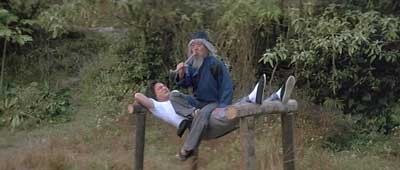
1) That Chien Fu not call him master, since they are friends.
2) That Chien Fu doesn’t show the skills that he’s learned unless absolutely necessary.
3) If Cheng-Tien fights with others, Chien Fu is not allowed to help.
Of course Chien Fu enthusiastically agrees, and we get a series of terrific training sequences, generally featuring Pai Cheng-Tien sitting or laying on Chien Fu while he does something particularly difficult or dangers – like doing push-ups with his fingers over lit incense. Occasionally Chien Fu tries to test his kung-fu skill against Cheng-Tien, but inevitably gets his butt kicked. Again, not the first film which featured a young, brash student learning patience and humility from unique training methods, but certainly the one that most directly influenced what was to follow.
Later, the Hung-tai school is visited by representatives of the Wei-wu school, who are upset that their Three Province Champion (Tino Wong) wasn’t given congratulations from the Hung-tai teachers. The champion demands that the two teachers face him at the same time, and he quickly mops the floor with both of them. Seeing their teachers humiliated, the students all leave the Hung-tai school and join the Wei-wu school instead. This makes a returning Master Hung (Charlie Chan) – the actual leader of the Hung-tai school – rightfully pissed off. Finding only Chien Fu left at his school, the two head to the Wei-wu school to get some revenge.
Ok. Believe it or not, we’ve yet to see Jackie Chan participate in any significant fights up to this part of the movie, and the fight scenes as a whole have been rather lacking. That’s about to change immediately. Arriving at the school, Master Hung has a brief fight with Mr. Liang (the brick breaking guy) before getting his butt kicked by the Three Province Champion. I’m not sure he’s actually given a proper name. Watching his master get pummeled, Chien Fu decides to finally let loose and show what he’s been taught – despite that being EXACTLY one of the things he was told not to do. We get a terrific fight between Jackie Chan and Tino Wong that serves as one of the benchmarks of kung-fu cinema up to that time. The smile plastered on Chien Fu’s face is revolutionary, a world away from the intensity of Bruce Lee or even the stoicism of Jimmy Wang Yu.
It’s a great fight, and we finally get to see some of the unique snake style in action against Tino Wong’s Outgoing Mantis style. Unfortunately, so does Lord Sheng Kuan – who just happens to be walking by during the fight – and recognizes that Pai Chang-tien must be nearby. But Pai Chang-tien wanders by as well, seeing Sheng Kuan and realizing that it’s time to make himself scarce. Chien Fu returns home after winning the fight to discover that his master has taken off, though he’s left a guide that explains the rest of the Snake Fist training.
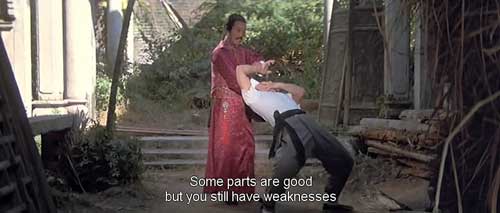
Chien Fu tries to find Chang-tien, but instead runs into Lord Sheng Kuan, who pretends to be Chang-tien’s brother – proving it by showing off some of his own Snake Fist technique. The two have a brief, comical fight – where Chien Fu continually loses despite protesting that he’s not trying his hardest since he’s fighting his “uncle” – before Chien Fu is tricked into alerting Sheng Kuan if Pai Chang-tien is to return. Returning to his house, we get some of that classic kung-fu cinema animal cruelty! Yep, Chien Fu finds his cat being attacked by a snake, but instead of jumping in to help he watches intently as “Kitty” uses his claws to eviscerate the reptile. He also discovers that the cat has torn apart the Snake Fist guide before he was able to complete it. Oops. Chien Fu decides to incorporate these Cat Claw moves into his own Snake Fist training, creating a brand new style from the melding of the two animal techniques.
You can probably see where all of this is going. Pai Chang-tien finds the hanged body Chao Chi-chih, and has a brief fight with one of Sheng Kuan’s goons, before returning to the kung fu school and Chien Fu. Overjoyed at his master’s return, Chien Fu serves him tea – and we see the (up to this point rather innocuous) cook put poison in it, before Chien Fu runs off to retrieve what he thinks is Chang-tien’s friend. Recognizing that it’s a set-up, the beggar runs off over the wall, with Sheng Kuan close behind and Chien Fu trying to keep up.
Chien Fu encounters the missionary, who reveals that he a) is Russian and b) is one of Sheng Kuan’s men. The two have a great fight, where Roy Horan demonstrates his skill with a very real looking sword. Jackie eventually tries out his new combined style by attacking the Russian’s balls. That will definitely do it.
But that’s all a set-up for the main event. Finally, we get a confrontation between Pai Chang-tien and Sheng Kuan, who discuss their various grievances (“You’re nothing but a sloppy snake!”) before finally jumping into a fight. Ignoring his promise to his master – though he never paid them much attention in the first place – Chien Fu jumps into the fray and we get our climactic confrontation – Jackie Chan vs Thunderleg. Check it out:
Now, look a little closer. During the fight, Jackie had his front tooth kicked out, which is clearly visible in the second half of the fight. Ouch! Anyway, that fight is amazing, and a true culmination of everything Chien Fu has learned in the film. Oh! And remember how that cook poisoned Pai Chang-tien? He shows up at the end, revealing himself to be a pawn of Sheng Kuan before trying to stab them. Of course, as I’m sure you remember, Pai Chang-tien only drinks his tea cold. What a nut! So, he never got poisoned, and the two happily murder the cook.
The film ends with Pai Chang-tien admiring Chien Fu’s new kung-fu style, and suggesting he call it.. wait for it.. SNAKE IN THE EAGLE’S SHADOW. I probably would have tossed “cat” in there somewhere, but what do I know? THE END.
For anyone interested in the films of Jackie Chan, the late-70s rise of Golden Harvest, the career of Yuen Woo-ping, or – really – old school kung-fu in general, this is one of those films that are so essential – and that have been so imitated – that at first glance it may seem rather disappointing. True, the fights in SNAKE IN THE EAGLE’S SHADOW pale in comparison to DRUNKEN MASTER or some of Jackie’s later films, and the plot is something you’ve likely seen dozens of times if you’re a fan of the genre, but this is the film that set the mold that these others would follow. It set the entire tone of martial arts films for the following decade, with a more acrobatic and comedic style quickly dominating – and launching the careers of Jackie’s Peking Opera classmates.
About as essential as old school kung fu gets.
NEXT WEEK: THE STRANGER AND THE GUNFIGHTER (1974)
Long live the fist,
Sweetback
- [THE BIG QUESTION] WHAT’S YOUR FAVORITE FEMALE ENSEMBLE IN MOVIES? - July 22, 2016
- [IN THEATERS NOW] THE BOY (2016) - January 24, 2016
- Cult Movie Mania Releases Lucio Fulci Limited Edition VHS Sets - January 5, 2016





No Comments